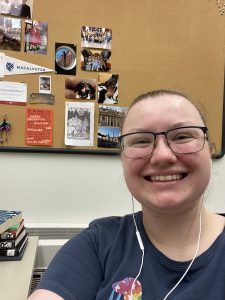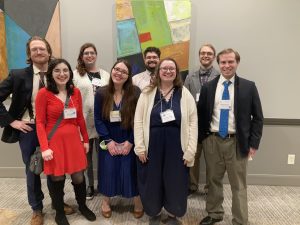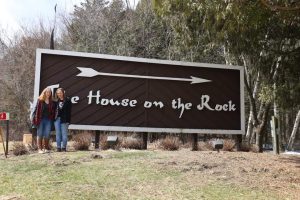By Alice Asch ‘22
I had the recent pleasure of speaking with four alumni: Amy Vandervelde ‘21, Amanda Zimmerman ‘16, Ella Brakob ‘16, and Josh Weiner ‘16. They’ve taken fascinating routes since graduating—and they’ve all found ways to apply their English major skills to their various occupations. Enjoy their interviews below!

Amy Vandervelde ‘21 is a former English department student worker AND Words editor! She graduated just last spring, with majors in English Lit and Classics, and a Political Science minor. Amy’s now a PhD student in Classical Philology at the University of Illinois at Urbana-Champaign (UIUC), where she focuses on Latin and Ancient Greek. She’s currently researching the mythical figure of Perspehone.
Do you have a favorite memory from the English department? What about a favorite class/professor?
I think my favorite memories are days spent in the copy room early on Monday mornings with my fellow student workers—Dalton Greene, Julia Joy, and Sophie Hilker. We always had a fun time setting up Bagel Monday and starting the coffee up. Dreary Mondays were always all the better when I was in the Mac English department.
If I had to pick a favorite class in the English department, I would choose Professor Geng’s Demonology course. I absolutely loved that class. It was the perfect amount of spooky and gothic horror.
Do you have a favorite memory from The Words?
This is a hard question for me. I really enjoyed all of my time spent as an editor for The Words. I always loved our writing process when we were wrapping up edits and having our weekly meetings alongside department Treat Night. Writing for The Words gave me the opportunity to share the wholesome experience of being a part of the Mac English department community with others and to spread the word about all the exciting aspects of our department.
What has been the most surprising thing about your grad school experience so far? How about the most exciting thing?
Grad school has certainly already been full of surprises, but I think the most surprising element has been how much the grad student cohort here reminds me of the great groups that I was a part of at Macalester. We are all a totally supportive bunch here, and we are always cheering each other on. Some of us within the Classics grad cohort have even formed an intramural softball team this year, so we’ll see how that goes for us.

My most exciting experience in grad school was attending my first academic conference with some of my department peers. We traveled from UIUC to Wake Forest University in North Carolina for the 118th Classical Association of the Midwest and South conference just last week. It was an unforgettable experience. We were able to bond as a group outside of our usual setting, and I had so much fun attending panels and listening to my peers’ papers and those of other colleagues that I met at the conference.
How did your time at Macalester (specifically in the English department) influence your grad school experience?
My English major experience has supported me leaps and bounds here in grad school. While my program is heavily language focused, I like to look at things from a very literary perspective, which often helps me find some interesting research ideas. Some of the papers I worked on in my undergrad time at Mac—like a paper of mine that Professor Elkins knows well on intertextuality in Ali Smith’s Autumn—have continued to stay with me here in grad school. One of my current papers that I am working on is looking at intertextuality in Cicero’s translated poetry. The literary theories that I learned and worked with in undergrad are framing many of my questions in grad school.
My undergrad experience has always greatly impacted the way I approach writing assignments. From every literature and creative writing class I took at Macalester, I have come to grad school with a clear sense of how I like to write and revise my own writing. I still change it up and try new methods every once in a while, but generally all of my writing work in undergrad has bettered my graduate writing astronomically.
What advice would you give to current English majors who are applying to grad school? What do you wish you’d known as an undergrad?
My advice: you have far more skills than you give yourself credit for. I am not someone with the greatest sense of self-confidence, so trust me when I say this. You are far more skilled than you admit. You don’t want to be hubristic in your applications by any means, but you should be confident in your abilities. It’s something I’m still working on. Small things from not saying “this paper is totally bad” to saying “this paper has some not so great pieces, but it has some awesome ideas in it as well.” These little changes in your attitude and self-confidence can go a long way.
And the advice I give my students here at UIUC: it’s really hard to ask for help, but it’s also really important to ask for help. Things come up and the world might seem to be falling apart around you, but your professors and your TAs are here to support you in your learning. It takes an extraordinary amount of courage to ask for help, and you deserve the help you need to succeed.

Amanda Zimmerman ‘16—another former student worker—has joined the exciting world of podcasting! Along with her friend and fellow Macalester alum Ella Brakob ‘16, she hosts “Scully Nation,” where they discuss an episode of The X-Files every week. You can listen to it on Apple Podcasts here! Amanda also works as a project manager at a non-profit consulting firm in the Twin Cities.
Do you have a favorite memory from the English department? What about a favorite class or professor?
I really loved my time as a student worker in the department. I was able to help out at amazing book launches, hone my writing skills as a newsletter editor, and meet an amazing community of people. Jan is the best and I’m grateful I’ve been able to keep in contact with her. I also had the pleasure of taking some wonderful classes that challenged me and changed my perspective. Some of my favorite classes were Re-writing the Victorians with Lesley Goodman, Shakespeare with Terry Krier, and Literary Publishing with Anitra Budd.
Where did the idea for “Scully Nation” come from?
Ella and I had a few radio shows at WMCN when we were at Macalester, including an English Department show called The Spoken Words. We both enjoyed being on the radio (probably something about public speaking without actually having to see the public you’re speaking to – it makes it a lot easier). After college, we knew we always wanted to do a podcast. I mean, who doesn’t have a podcast these days? We kicked around ideas, including one where we took a more academic approach to analyzing genre films. All those ended up being pretty time consuming for two people with full time jobs who never intended to monetize the podcast. So we settled on Scully Nation.
What’s your favorite part of podcasting?
Someone once said a podcast is like having a band: it’s basically an excuse to hang out with your friends on a regular basis and do something creative together. I like having a reason to consistently set aside time to be with my friend despite our busy lives. Knowing that strangers (however small that group may be) also enjoy our nonsense and inside jokes is an added bonus. And I get to watch The X-Files! It’s a win-win.
How did your experiences as an English major at Macalester influence your work in podcasting?
Our origin story was really The Spoken Words radio show. That’s when Ella and I realized we enjoyed broadcasting/podcasting together. Lots of credit and love to Jan Beebe, who encouraged us when we were student workers in the English Department.
What advice would you give to current English majors? What do you wish you’d known as an undergrad?
I know the world has changed significantly, even in the years since I graduated. But it’s still true that your experiences as English majors at Macalester prepare you for a lot. When it comes to searching for jobs, it’s easy to feel like an English degree is hard to market. But you’re all great writers, editors, critical thinkers. You’ll find your path, even if it’s not what you expected when you graduated. You also gotta find something you love to do outside of work. Enjoy your hobbies for their own sake – they’ll keep you sane.
Of course, we couldn’t interview Amanda without also speaking to Ella Brakob ‘16, her podcasting co-host!
Do you have a favorite memory from the English department? What about a favorite class or professor?
Working in the English Department and just spending time on the second floor with everyone coming in and out all day long was always a relaxing vibe and a good way to connect. Also, every Treat Night, of course. I took a lot of great classes in the English Department, but I was partial to my Novella capstone class with Peter Bognanni.
Tell us about “Scully Nation”!
We don’t take it too seriously, it’s just a great excuse to spend time with friends and spend time talking about something we love in detail. Sometimes, we accidentally stumble upon serious media criticism, but mostly we just goof around about all the 90s fashion and logical leaps the show makes.
What’s your favorite part of podcasting?
The act of recording the podcast is always a fun two hours in my week, but it also gives us a sense of accomplishment and ownership over something that we spend time on producing. There’s watching the episode, taking notes and researching background info on the production/writing/actors/etc., then the technical aspects of making sure our microphones/sound are good, promoting the show on social media, and interacting with listeners. Even though it’s more of a hobby than a vocation, it’s a fun and fulfilling use of time.
How did your experiences as an English major at Macalester influence your work in podcasting?
I like to think that our experience hosting the English Department show gave us a leg up on keeping up the chatter over the course of an episode.
In a broader sense, how did your time at Macalester influence your post-grad experiences?
I think my time at Mac helped prepare me for thinking critically not just about literature, but media and culture as a broader category. I learned how to be open-minded, but not to take things at face value. This is a mindset that I hope I’ve been able to bring to various parts of my post-grad life.
Besides podcasting, what else have you been up to since Macalester?
I’ve been working on writing a novel that I’ve just finished up recently in this past year.
What advice would you give to current English majors? What do you wish you’d known as an undergrad?
Spend more time at Treat Night! Take plenty of classes in all sorts of departments, broaden your horizons, and pick up a minor just because you can.
Josh Weiner ‘16 has taken a completely different route—he now works as a flight paramedic!
Do you have a favorite memory from the English department? Favorite class or professor?
Hard to choose! Some contenders: winning an impromptu competition in Prof. Matt Burgess’s class; going to a screening of Hamlet in Penelope Geng’s Shakespeare class; helping with the faculty hiring committees; many, many, department events and meals.
What have you been up to since Macalester? What are you doing now?
I started training as a paramedic before even graduating from Macalester, and have been in that line of work ever since. I’ve spent time in Minnesota, Wisconsin and Arizona. Currently I work as a paramedic here in the Twin Cities. We provide critical care and transport to patients by helicopter and airplane all over the Upper Midwest. It’s a ton of fun and very rewarding. I’m also starting graduate school this fall!
How (if at all) did your experience as an English major influence your current line of work?
In many ways. As an English major you learn to analyze closely, be persuasive, weigh different perspectives, critique your own work and your peers’, and consider nuance. I use these skills every day, and you will too, regardless of your line of work.
What advice would you give to current English majors? What do you wish you’d known as an undergrad?
The relationships you are building are as important as the books you’re reading. Cherish and nourish them.
We thank Amy, Amanda, Ella, and Josh for taking the time to speak with us!
Responses have been edited for length and clarity.